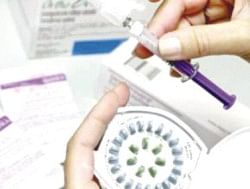| Health

Farizaa Sabreen
Contraceptive use has been a much debated topic all over the world in terms of who should bear the responsibility of contraception, the man or the woman. Ideally, there should be equal responsibility but in many countries, culture and traditions play an important part. In Bangladesh contraception most often is the responsibility of the woman although sometimes control of her body is not guaranteed due to sexist attitudes and misinterpretations of religion by clerics.
For Bangladeshi women the most common contraceptives are birth control pills, Copper T, implants and injectable drugs. Some women prefer tubectomy as a more permanent solution. Most women prefer to take birth control pills as it is easier than most contraceptive methods. Women get less menstrual bleeding with the use of oral contraceptive pills but some do experience irregular periods, nausea, headaches, or weight change.
“There are two types of Injectable Contraceptives (IC) available in the market. They are Net-En, which is to be given every two months and the other, Depo Provera, which is to be implanted every three months,” says Dr Maliha Rashid, former Head of Department of Gynecology, Dhaka Medical College and now working as consultant of Central Hospital. According to Dr Ferdausi Purobi Chowdhury, Assistant Medical Officer of Dhaka University, “Depo-Provera is a hormonal injection and each injection provides three months of protection against pregnancy. But many women stop getting their menstrual period while receiving this. The other side effects are weight gain, fatigue and possibly a decrease in bone density.”
 ICs are widely accepted as a temporary method of contraception in Bangladesh. These are made up of progestational compounds. Progesterone is one of the female sex hormones, which is normally present in healthy, adult women during the latter half of their menstrual cycle. ICs are used in maximum cases where Estrogen another hormone -- containing oral pills are contraindicated or is not tolerated by the body. ICs are widely accepted as a temporary method of contraception in Bangladesh. These are made up of progestational compounds. Progesterone is one of the female sex hormones, which is normally present in healthy, adult women during the latter half of their menstrual cycle. ICs are used in maximum cases where Estrogen another hormone -- containing oral pills are contraindicated or is not tolerated by the body.
“Now 3,762,752 women take injectable contraceptives,” says an administrative officer of the Directorate General of Family Planning. She says that the survey held on October 2010 covered the whole country except the City Corporation.
“The effect of IC is fast. They start working within 24 hours after administration. They can be given to lactating women also. There is no need to use any other form of contraception during this period. Some women are not comfortable using it as they suffer from irregular menstruation,” Dr Maliha explains.
Another method is known as contraceptive implants, which is a hormone product. Implanon is about the size of a thin matchstick, which lasts for three years. It contains an etonorgestrel hormone and is usually inserted under the skin of their left upper arm, not far above the elbow. It can be removed whenever necessary.
Norplant has been a widely practiced method of family planning in Bangladesh since 1985. “The NorplantR implant1 is a progestin-only hormonal contraceptive method for women. The hormone is supplied by six small silicone rods implanted in an arm by a minor surgical technique. It remains effective for at least five years. You need surgery if you want to remove it. Normal fertility returns after the removal. And if you want to continue the method, a new set of implants needs to be inserted straight away,” says Dr Maliha.
She says that Norplant is a long-term method of birth control, but it causes depression, weight gain and light or no menstrual periods. As it requires minor surgery and insertion of the tiny rods underneath the skin, women seldom use it.
“Tubectomy is a female sterilisation method. It is a permanent method of contraception but is not suitable for anaemic and malnourished women. Some women have mood swings and lower sex drive after doing tubectomy,” she says. “Tubectomies are subsidised by the government and the procedure is offered free of cost in Bangladesh,” she says.
“Intra-uterine contraceptive devices like Copper T are also common here. Copper-T is inserted into one's womb. Side effects are heavy bleeding and pain, infections, allergies and tubal pregnancies,” Dr Maliha cites.
Dr Maliha also thinks tubectomy, implants, injectables and copper T are more popular in illiterate village women, due to its long-term effects. Urban women are more alert and health conscious. So they either go for pills or traditional method or depend on their spouses.
“Health workers of grass root levels motivate and provide village women this type of method. These methods are also available in union sub-centres, upazila health complexes and Mohammadpur Fertility Centre in Dhaka.”
Different contraceptive methods have different advantages and disadvantages. A woman should decide and choose which is suitable for her. Young people usually don't want to use intrauterine devices (IUD) or intrauterine systems (IUS).
Copyright
(R) thedailystar.net 2010 |
